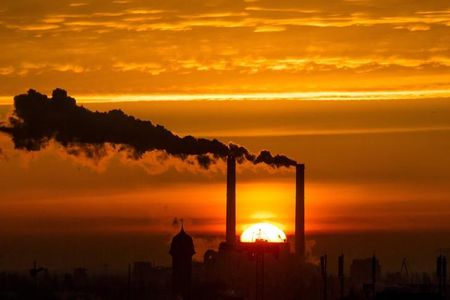Is global warming accelerating?
2024.10.06 05:12

Investing.com — Investment bank and financial service firm Jefferies released a report on Thursday, where it discussed whether warming due to climate change is accelerating.
Citing a discussion with climate experts, Jefferies notes that there is evidence of warming acceleration, but the extent of this depends on the timescales being considered.
Global emissions from fossil fuels have quadrupled over the last 60 years, rising from about 22 GtCO2 per year to around 40 GtCO2 post-2010s, speeding up the warming of the planet.
Meanwhile, natural systems like land and ocean carbon sinks are absorbing a large share of emissions, however, their efficiency appears to be declining. These systems still absorb around 55% of emissions, but their capacity to keep up with the growing levels of atmospheric CO2 is waning.
One of the key points highlighted in the report is the direct relationship between cumulative CO2 emissions and temperature rise, which is evident across Earth System Models. At current emission rates, the remaining carbon budget for limiting warming to 1.5°C is approximately seven years, with only 28 years remaining for the 2°C threshold. The data suggests that the world is on a tight timeline to limit warming.
The acceleration of warming, as measured by some scientists, shows a rate of 0.18°C per decade from 1970 to 2010, increasing to at least 0.27°C per decade post-2010. Yet, the argument for acceleration becomes more convincing when comparing long timescales, such as 1880-2010 versus 2011-2023.
Shorter 20-year periods, like 1970-1989 versus 2004-2023, show less evidence of acceleration, suggesting that conclusions about warming trends can differ based on the selected timeframes.
Sulfate aerosols, which have historically had a cooling effect by reflecting solar radiation, have been reduced through regulatory measures due to their harmful health effects. According to the experts, this reduction may also be contributing to acceleration.
“With fewer aerosols, there is less cooling, and this could also be contributing to the acceleration of warming,” Jefferies said in the note.
Whether global warming continues to accelerate will depend largely on how emissions are managed moving forward.
Carbon removal strategies, such as Direct Air Capture (DAC) and Bioenergy with Carbon Capture and Storage (BECCS), are gaining attention as potential solutions to help reduce future warming. Nevertheless, without significant changes in emission levels, warming—and its associated impacts—will likely persist.
“Whether the rate of warming continues to rise or not will depend on our ability to mitigate emissions. As long as emissions continue to rise, climate change with continue with increasing impacts and need for adaptation,” the report concludes.








